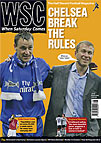 The defection of Spurs’ sporting director was merely the latest example of money trumping loyalty, says Adam Powley
The defection of Spurs’ sporting director was merely the latest example of money trumping loyalty, says Adam Powley
The world’s greatest finder of football talent or a glorified scout? Opinions on the merits of Frank Arnesen have tended toward either extreme, depending on which club you support and which newspaper you read, but for Tottenham fans at least, the Dane has joined Sol Campbell in White Hart Lane’s hall of infamy.
Arnesen’s reputation at Spurs evaporated the instant the story broke that he wanted to decamp to Stamford Bridge. The grievance centres on his decision to ditch Daniel Levy’s three-tier management set-up in favour of a role that appears to offer greater rewards for less responsibility. Rather than having overall control of a club’s football operation, Arnesen will be in charge of scouting and overseeing Chelsea’s youth system. His reported comment that the deal would “set me up for life” suggests money was the deciding factor, but that belies how the saga illustrates football’s changing power relations.
Given that every club is commonly regarded as guilty when it comes to approaching players in a manner not entirely in keeping with the rules (and Spurs have been as voracious a predator as any other in football’s food chain), it is difficult for Tottenham to protest too loudly. Indeed, as one of the prime movers in the commercialisation of football under Irving Scholar and then Alan Sugar, it is also arguable that Spurs have helped to create the conditions whereby a club run like Chelsea could thrive.
So what are Chelsea going to get with their latest expensive acquisition? Criticism has been made of Arnesen’s performance as Tottenham’s sporting director. The man who found Ronaldo and Ruud van Nistelrooy when he was at PSV Eindhoven was expected to deliver similar gems to north London. Instead, an assorted array of promising but unproven (and cheap) young players from home and abroad swelled the first-team squad.
It was a hit-and-miss policy but was perhaps reflective of who Arnesen could realistically attract. At PSV he could dangle the carrot of regular European football and domestic trophies; at White Hart Lane, he had a successful past and only the promise of a brighter future with which to entice emerging talent.
Arnesen’s real work reputedly went on behind the scenes. He had transformed the medical department and the youth system, while the appointment of Martin Jol, first as coach and then as successor to Jacques Santini, suggested he was slowly but surely building the foundations for progress. With his departure those foundations look uncertain once more.
The enduring patience of Spurs fans is to be tested yet again as Levy searches for a replacement. Levy had heralded his “continental system” as a means to ensure stability but, with two sporting directors and effectively three managers in a little over 18 months, his plans have been dealt a severe blow.
Meanwhile, the Tottenham bush telegraph has been buzzing with rumour and counter rumour, with murmurings of earlier approaches and clashes over transfer and wage policy long before the current furore. In the background is the spectre of Chelsea, seemingly immune to sanction, levering their position as football’s highest bidder to cherry-pick and undermine other clubs.
As ever, it’s the supporters who lose out. Arnesen had effectively been made redundant as PSV’s director of football and Spurs offered him the chance to extend his career in an influential and well paid role. Just a few months ago he was imploring players and fans to buy into a Tottenham future he was instigating. He was, in effect, asking for loyalty. Instead, he has now opted to trade his own faith in the Spurs project for greater riches and a greater chance of immediate success at Chelsea.
Yet outrage has not been confined to Tottenham fans. Journalists, some of whom had hitherto been more than happy to fawn over Chelsea’s every move, suddenly found a moral purpose and demanded Spurs report Chelsea “for the good of the game”.
Chairmen of other clubs joined in, encouraging Levy to make an example of the champions. Chief among these, it has been mooted, are those who stand to gain the most should Chelsea face a points deduction. Meanwhile, Spurs’ prime concern has been to try to ensure they receive adequate compensation – in other words money. The transformation of football from a sport into a naked competition for cash continues.
From WSC 222 August 2005. What was happening this month